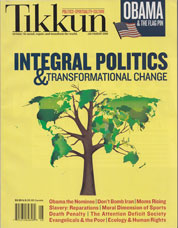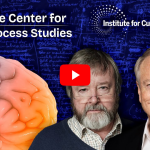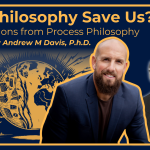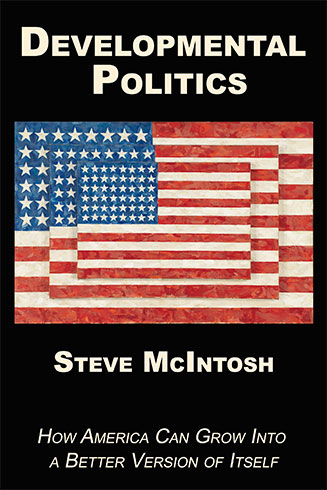Integral Politics and the Evolution of Consciousness and Culture
 This article by Steve McIntosh was originally published in the July/August 2008 print edition of Tikkun Magazine.
This article by Steve McIntosh was originally published in the July/August 2008 print edition of Tikkun Magazine.
I have always identified myself as a “spiritual progressive,” but I think it is possible to be both “spiritual” and “progressive” while continuing to cherish the economic and personal freedoms that are an indelible part of America’s “capitalist” system. Nevertheless, I appreciate the sentiments and concerns being expressed by Rabbi Lerner and other writers for Tikkun Magazine. At the same time, I’m also disappointed by the relative failure of progressive politics to make much of a positive difference in America during this decade. As I’ve thought about what can be done to improve the “political condition” of our country, I’ve come to see how every problem in the world is, at least in part, a problem of consciousness—a result of worldviews that are no longer adequate to the challenges of our time. So it follows that the solution to almost every problem involves the raising of consciousness. And by following this insight about consciousness, I have come to appreciate how the newly emerging “integral perspective” is our best hope for raising consciousness in America.
The integral perspective recognizes that consciousness evolves through a series of distinct worldviews, each of which results in new perspectives, new concerns, and new values. These worldview stages have been carefully mapped through the empirical research of developmental psychologists such as Robert Kegan and Lawrence Kohlberg, as well as through the research of sociologists such as Ronald Inglehart and Paul Ray. This research confirms that the American political milieu can no longer be accurately characterized as only a simple left-right continuum. Rather, our national political landscape can also be understood as a three-way struggle between the historically significant worldviews identified as traditionalism, modernism, and what is coming to be known in integral parlance as postmodernism.
The word “postmodern” is, of course, a battleground of meaning. But even though it has been used to describe discrete subsets of culture, such as art movements or critical academic theory, integral thinkers use this term as an overall description of the distinct worldview that has arisen in the last fifty years as an alternative to the stale materialistic values of modernism and the chauvinistic and oppressive values of traditionalism. This large demographic group (comprising approximately 20% of the U.S. population) is also known as the “cultural creatives,” the “post-materialists,” and the “green meme.” Although there is as yet no clear agreement on terms, the “postmodern” label is becoming the most widely used because it well-describes the antithetical relationship that much of this worldview has with modernist and traditionalist culture.
The postmodern stage of culture has already made significant progress in the fight for human rights; through the progress it has made in raising our society’s concern for the environment; and in the way that American culture has now become more tolerant of alternative lifestyles and more conscious of the values of spiritual pluralism. Although there is obviously much more work to be done in these areas, when we compare our current national culture to the state of American culture in the 1950s, it appears that evolution has been achieved through the rise of the postmodern worldview. And this worldview is continuing to actively develop and persuade people about the importance of its issues and concerns. Yet there are also signs that this worldview is no longer showing the same creative vitality and dynamism that characterized its emergence in the 1960s and 1970s. As we come to appreciate the way culture actually evolves, we can see that it is unlikely that the majority of Americans will experience a “great awakening” and adopt the postmodern worldview anytime soon. Although postmodern ranks are growing, at this rate it may take generations before the majority of the American body politic becomes conscious enough to effectively deal with our environmental crisis and elect leaders who will conduct a more moral foreign policy. And just scolding people, just admonishing them to care more and be more responsible is not going to produce the results we need. The pace at which our global problems are increasingly becoming “more local” requires that spiritual progressives find a way to become more effective at raising consciousness.
The Integral Stage of Culture
Although the healthy version of the postmodern worldview represents the most evolved form of culture that has yet to appear, postmodernism is not the end of history. So as we come to see signs of postmodernism’s consolidation, as we recognize both the successes and failures of postmodernism, we can begin to discern how the next stage of cultural development is likely to appear. Integral thinkers contend that the next significant worldview to emerge along the timeline of human history will be something very much like the distinctive new worldview now being enacted by integral philosophy.
Integral values include an enhanced sense of personal responsibility for the problems of the world, new insight into the developmental nature of the “internal universe of consciousness and culture,” and an enlarged appreciation of conflicting truths and dialectical reasoning. People who have gained an integral perspective appreciate the problem-solving potential of evolutionary philosophy, and they aspire to harmonize science and spirituality. And perhaps most importantly, the integral worldview provides the ability to more effectively use the values of all previous stages of development. This emerging understanding, known as “integral consciousness,” thus strives to achieve new cultural evolution through its enlarged ability to evaluate and discern that which is beautiful, true, and good.
Unlike the worldviews of traditionalism, modernism, and postmodernism, which tend to see each other primarily for their pathologies, the integral worldview can more clearly see both the good and the bad of each worldview in proper proportion. The integral perspective thus recognizes that each one of these worldviews has made (and is continuing to make) indispensable contributions to the structure and function of our society. And this increased sense of sympathetic solidarity and empathy for the healthy values of every worldview allows integral thinkers to better distinguish and tease apart the pathological aspects of traditionalism and modernism (as well as postmodernism) from the foundational and enduring values of these worldviews—values which we must retain and use in our efforts to build higher levels of civilization.
History shows that modern and postmodern culture cannot be sustained unless the enduring contributions of earlier levels of social development are in place and functioning. For example, without a stable base of traditional culture, attempts to develop functional forms of modernist culture often collapse back into the chaos of pre-traditional social structures as a result of corruption and conflicts between rival groups. And just as healthy forms of traditional culture are a precondition for the establishment of the cultural structures of modernism, healthy forms of modernist culture are likewise prerequisite for the successful establishment of postmodern culture. Although we are now confronted with the global problems created by modernism’s inherent limitations, such as global warming and environmental degradation, unduly aggressive foreign policies, and the excessive materialism seen in much of the developed world, the postmodern consciousness that is generally required to recognize, criticize, and address these problems is itself predicated on the underlying and ongoing successes of modernism. That is, the majority of spiritual progressives have achieved their worldcentric perspectives as a result of having benefited from the prosperity and educational opportunities that come from living in the developed world. Most postmodernists are insulated from life-threatening violence, and most do not have to worry about how they are going to feed their children. And this freedom from the pressing threats to survival and security that affect so many in the developing world is generally necessary for the development and maintenance of worldcentric forms of morality among politically significant portions of a population.
Thus, from an integral perspective, the values and social structures of traditionalism, modernism, and postmodernism must work together as a kind of “cultural ecosystem” wherein each stage continues to contribute its enduring and foundational values, and wherein the pathologies and negative evolutionary scaffolding of these stages are subject to continuous pruning and moderation. Moreover, “the battle begins anew with every birth”—the research confirms that children generally pass through these developmental stages as they grow up. So just as the perspectives and capacities of these older worldviews are necessary for the continuing functionality of our society as a whole, the ongoing viability of these cultural structures is also necessary for the healthy development of each individual as they grow up from childhood.
The integral worldview’s evolutionary perspective on values yields a new understanding of what might be called the “physics” of the internal universe of consciousness and culture. And through this deeper understanding of how dynamic systems of agreement are formed within a culture, we come to see why postmodernism is not more successful politically.
In summary, the integral perspective is a worldview that transcends but also includes the values of postmodernism. The integral worldview carries forward all the essential principles and sensibilities of the postmodern worldview while simultaneously integrating the best of postmodernism together with the foundational values of the pre-traditional, traditional, and modernist worldviews. The integral worldview thus achieves its evolutionary advance through an integration and harmonization of all previously existing worldviews within a new and inclusive light. Indeed, the whole point of integral consciousness is to move beyond the idea of “old paradigm bad, new paradigm good.” This is not to say that integral thinkers value every worldview equally; they readily see that postmodernism is generally more evolved than any previous worldview, but they can also see where postmodernism is not evolved enough to effectively deal with the growing global problems that are here today.
How Integral Consciousness Can Achieve Political Evolution
Spiritual progressives are keenly aware of the fact that much of the postmodern political agenda is effectively trumped at the national level by the fact that approximately 30% of America has a center of gravity at the traditional stage of consciousness. And ironically, it is the rise of postmodernism that has produced the culture war and provided the very life conditions that have politically empowered the religious right.
Yet from an integral perspective we can see that when we fight the culture war we only strengthen the more regressive segments of these older cultural structures. The more we condemn the “value poverty” of traditionalism and modernism, the more we push people into their corners, feeding into the fears that give rise to each stage’s particular kind of orthodoxy. And as the orthodox segments of each worldview become more powerful, this makes positive progress more and more difficult.
The cultural structures of postmodernism originally gained energy and power in the 1960s and 1970s by pushing off against the problems of the modernist-traditionalist establishment. Postmodernists seized the ground of antithesis and used this stance to build alternative forms of culture which continue to serve us today. However, the indelible imprint of cultural antithesis that characterizes postmodernism at a deep level has now become a significant hindrance to further progress.
Rabbi Lerner has written that: “to succeed the antiwar movement needs to change from a movement that is ‘against’ to a movement that has a positive vision of what it is actually for.” Moreover, Rabbi Lerner acknowledges some of the positive progress that has been achieved by modernism. Yet the progressive politics championed by many writers for Tikkun Magazine continue to be colored by a polarizing rejection of many of the core values held by modernists and traditionalists. And it is this kind of polarizing separation that continues to fuel the culture war and prevent progressives from achieving more widespread agreement for the important social and environmental outcomes they care about. Therefore, in order to become more effective at raising the consciousness of the American body politic overall, progressives would do well to relinquish their grip on postmodernism’s “identity of antithesis” and show greater respect for our modernist and traditionalist cultural heritage. This is not to suggest that the integral worldview is seeking a middling compromise with the right—integralists are not “Machiavellian realists.” Rather, the integral perspective strives for a new synthesis that transcends and includes the best of what has come before.
Integral thinkers recognize how each worldview’s enduring and healthy values are closely woven together with their pathologies. And in order to tease apart the dignities from the disasters we have to “get in close” so as to better appreciate, and even identify with the positive values of these older worldviews and make them our own. It is this ability to get in close to the healthy values of every worldview that distinguishes the integral worldview and empowers it to produce cultural evolution. In fact, this ability to better integrate diverse values is actually a new epistemological capacity. Just as modernism brought an enhanced cognitive capacity for reason and logic, and just as postmodernism brought an enhanced emotional capacity for compassion for the disadvantaged and oppressed, the integral worldview provides an enhanced volitional capacity to “metabolize” a wider spectrum of values. This emergent capacity, known as dialectical evaluation, or what Ken Wilber calls “vision logic,” is able to effectively synthesize and integrate the enduring and foundational values of every worldview. And it is by better appreciating and embodying the values of each worldview that we will find new powers to persuade a significant portion of Americans to adopt a more progressive politics.
If we want to make political progress in America, if we want to see our elected leaders adopt more worldcentric and environmentally conscious policies, the integral perspective indicates that we need to start by raising consciousness at the traditional level, and thereby help everyone to move up from where they are. But we can’t expect the majority of people with traditional centers of gravity to simply change their minds and become postmodern; in general, the next step for them is modernism. The healthy values of modernism serve as an important bridge between the patriarchal values of traditionalism and the postmodern values of feminism, multiculturalism, and environmentalism. So as I’ll now explain, it is by helping a portion of those with a postmodern center of gravity to move up to an integral center of gravity that we can make the most progress at getting a portion of those with a traditional center of gravity to move up to the modernist stage.
The dynamics of the our culture’s internal ecosystem show us that stages become ripe for transition when they are most successful—when they deliver the successes, and the corresponding problems created by those successes, that are generally required for the emergence of the next stage. We can see this in history in the way that modernism originally arose after the reformation of Christianity in the Protestant countries where traditional culture had become most successful. And we can also see this in the way that large blocks of postmodern culture have only emerged where modernism has become well established. So if we want people to move up, history tells us that the best way to make that possible is to help the stage they’re at to become successful enough to serve as a platform for its own transcendence.
Therefore, the way to raise consciousness within the American body politic overall is to help traditional consciousness become a little more successful, by helping it better fulfill its cultural mission of contributing its enduring values to our society as a whole. And the best way to do this is to help reduce the polarization caused by the culture war. As more and more progressive postmodernists adopt the integral perspective and come to better appreciate the interdependence of all the stages of our cultural ecosystem, this will in turn help traditionalists and modernists to become more sympathetic to postmodern concerns. And as consciousness is raised across the board, this will cause America’s cultural center of gravity to move forward in history, resulting in a more progressive politics.
Moreover, just as the key to political progress in America starts with raising consciousness at the traditional level by making it more successful, winning the “war on terror” is also a matter of making Islamic traditional consciousness more successful. In the long run, the best way to help the Islamic world to become less stuck in the past will be for America to move its our own cultural center of gravity forward in history through the rise of the integral worldview.
It’s important to see how war in the 21st century is being fought primarily in the internal universe. The conflicts turn not so much on the actual military engagements, but rather on the results of the battle for hearts and minds. And it’s also important to see how wars are often fought with the tactics and technology of the previous era, resulting in costly losses and bad mistakes. So as we might expect, history is repeating itself in the war on terror—we’re fighting it with the tactics of World War II and the Cold War, wherein torture, secret prisons, and unjustified covert operations by the CIA and others are undermining our moral authority in the eyes of the world. Thus, any gains in the external universe produced by these tactics are more than offset by the losses they create in the battle for hearts and minds taking place in the internal universe.
As consciousness is raised, Americans will come to better appreciate that implementation of a more moral foreign policy is actually a critical part of a comprehensive and effective national defense. And this realization will show us where we need to change our tactics. For example, we can put an immediate end to all forms of rendition and torture, and we can carefully articulate a more transparent and accountable role for our intelligence services. We can announce this change in direction and the reasons for it, and then we can do some things to help heal the history that is continuing to hurt us today. For instance, we can pay for a memorial in downtown Tehran that memorializes our shame for the CIA’s regrettable intervention in Iran in the 1950s. We can symbolically atone for those sins, and help heal the wounds that are keeping us from developing a positive relationship with a country whose modernists remain favorably disposed to the United States.
We can also strengthen Islamic traditional consciousness by using integral technology to help empower the more moderate voices of Islam. For instance, we could endow a prestigious prize like the Nobel or Pulitzer called “The Qur’an Prize” that could be given annually to the writer in Arabic, Persian, or Turkish, who best demonstrates that violence is counter to Islamic principles, and that Islam is a religion of peace.
However, conducting a more moral foreign policy does not mean that we simply go soft on terrorism or adopt a predominantly postmodern foreign policy that ignores the very real threats posed by the unhealthy forms of traditional consciousness in the world. An integral approach to the war on terror involves using the solutions of every level simultaneously. For example, we can use a traditional approach by keeping the Navy in the Persian Gulf, we can use an modernist approach by continuing with the diplomacy of economic carrots and sticks. We can use a postmodern approach by apologizing and making amends for some of our past actions, and we can use an integral approach by becoming better at changing hearts and minds through the application of the kinds of integral technology I have discussed.
In the final analysis a large part of the solution to Islamic terrorism turns on the situation in Israel, but here again we need to start by raising consciousness at the traditional level. However, because of its history this will be a delicate matter. So an integral approach to raising traditional consciousness among Israelis will require that we work on multiple fronts simultaneously—continuing our commitment to their security, while also appealing to the higher moral sentiments of Israelis to find a way to better accommodate the Palestinians.
Ultimately, raising consciousness is a long-term cultural project that happens in the internal universe at the level of worldviews, values, personal identity, and loyalty. Yet as we become better at making common cause with every historically significant worldview, we will find that the polarization of the culture war can be reduced, defensiveness can be lessened, and consciousness can thus be more effectively raised. As we prune away the unhealthy evolutionary scaffolding of these earlier cultural structures in a way that then lets us carry forward the essential and enduring values of these worldviews, we find that we can also “carry forward” many of the modernists and traditionalists themselves into a new era of progressive agreement.
The Integral Worldview Can Help Us “Become the Change” We Want to See
Although integral consciousness is extremely useful as “a strategy,” it is more than just a tool for problem solving. It is also an identity-providing platform for cultural allegiance, a worldview that invites our loyalty and even our passion. We can see comparisons with this from history in the way that the new ideals of modernism spread during the Enlightenment with the rallying cry of: “Liberty, Equality, Fraternity”—a slogan which reached beyond the borders of France and served as an international invitation to adopt a new set of values emphasizing political transformation from monarchy to a new democratic society. Likewise in the 1960s, the call to transcend into postmodern consciousness was embodied in the slogan: “Turn On, Tune In, Drop Out.” And despite its irreverent quality, Timothy Leary’s rallying cry did serve as a potent invitation to reject the pathologies of the modernist worldview and join in a movement that reflected an entirely new set of values.
So now, as the integral worldview begins to emerge, we might expect a uniquely integral rallying cry that evokes the longing for a new politics that transcends left and right; a new science that embraces the interior domains as well as the exterior; a new art that reclaims the beautiful and the sublime; and even a new spirituality that recognizes the universal nature of spiritual experience. And it appears that the integral worldview’s invitation to evolve will take the form of the slogan: Transcend and Include. Transcendence and inclusion is a description of the master systemic pattern of overall evolution. It’s actually another way to describe the dialectical process of thesis, antithesis, and synthesis. And now, through integral consciousness we can begin to appreciate how the degree of our transcendence is measured by the scope of our inclusion.
Once we begin to see the evolving universe from the perspective of integral consciousness, we see how profound and all encompassing evolution truly is. Evolution isn’t just something that happened in the distant past; the same forces that turned rocks into rosebushes are actually more intense than ever now that humanity is beginning to understand how we are both the products of evolution and the agents of evolution. The first step was the Darwinian revolution in science; and now the integral revolution in philosophy is making it possible for us to become agents of evolution as never before.
Although the integral worldview is currently in its infancy, there are abundant opportunities to participate in this exciting cultural development. Wherever postmodern culture has become well established, there can now be found spiritual progressives who are beginning to investigate this intriguing new evolutionary perspective. The more you learn about the integral worldview, the more you may come to appreciate how its approaches are both idealistic and realistic. Browsing the web you will find a host of new books on integral philosophy, together with magazines, websites, salons, and gatherings of those who are coming together to discuss this new way of understanding the evolution of consciousness and culture. Ultimately, the best way to help those around you to evolve is to accelerate your own evolution by internalizing a larger spectrum of values. Thus, I heartily invite each of you to explore the integral worldview and begin using the power of this emerging perspective to make political progress and improve the human condition in spectacular ways.





